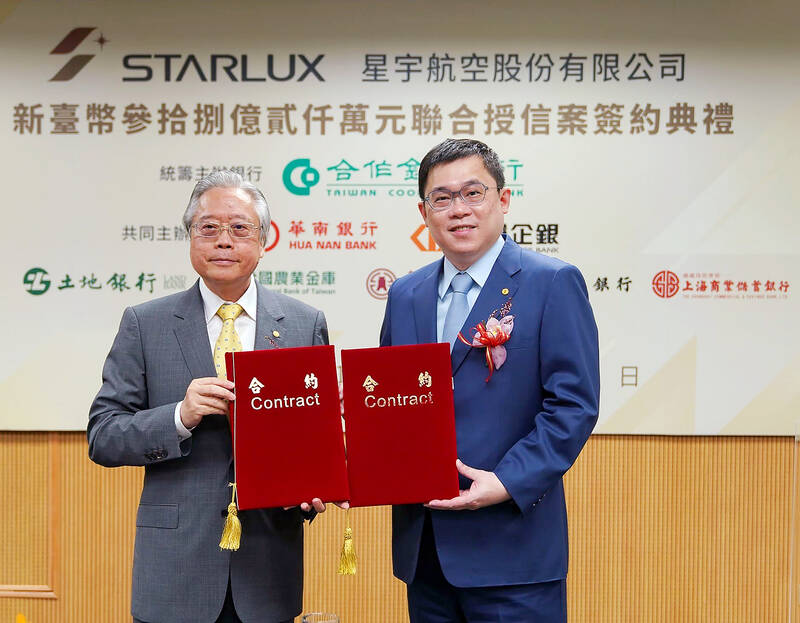Starlux Airlines Co (星宇航空) has reached a NT$3.82 billion (US$123.7 million) syndicated loan agreement with 10 local banks to fund the purchase of Airbus 350-900 passenger jets, which would be used on Asian and US routes, the airline said yesterday.
The syndicated loan was 52 percent oversubscribed by the banks led by Taiwan Cooperative Bank (合庫銀行), the airline said.
The other banks are Hua Nan Commercial Bank (華南銀行), Taiwan Business Bank (台灣企銀), First Commercial Bank (第一銀行), Land Bank of Taiwan (土地銀行), Agricultural Bank of Taiwan (農業金庫), Bank of Taiwan (臺灣銀行), Chang Hwa Commercial Bank (彰化銀行), Shanghai Commercial and Savings Bank (上海商業儲蓄銀行), and Bank of Kaohsiung (高雄銀行).

Photo courtesy of StarLux Airlines Co
Despite the negative effects of the COVID-19 pandemic, Starlux under the direction of chairman Chang Kuo-wei (張國煒) has secured the lenders’ support, Taiwan Cooperative Bank said in a statement.
It was the first syndicated loan for Starlux, after the airline conducted five capital injections to boost its paid-in capital to NT$18.11 billion since its establishment in 2018.
The airline plans to use the loan to purchase 18 Airbus 350-900 XWB jets, the first of which is to arrive next month, it said.
The wide-body jets would enter service on the carrier’s Asian routes in the first quarter of next year and start flying on its Taiwan-Los Angeles route from April next year, it said.
The airline would also take delivery of four Airbus 321neo jets and one Airbus 330neo aircraft by the end of this year, boosting its fleet size to 19, it added.
Chang said the airline would use the Airbus 350-900 jets on long-haul flights and expects services to North America to boost its international presence.
Starlux said that revenue in the first eight months of this year grew 130 percent year-on-year to NT$1.1 billion.
During the same period, passenger revenue rose 173 percent annually and cargo revenue rose 107 percent annually, it said.
The airline posted a net loss of NT$2.66 billion in the first half of this year, with accumulated losses reaching NT$9.59 billion since its establishment.

MULTIFACETED: A task force has analyzed possible scenarios and created responses to assist domestic industries in dealing with US tariffs, the economics minister said The Executive Yuan is tomorrow to announce countermeasures to US President Donald Trump’s planned reciprocal tariffs, although the details of the plan would not be made public until Monday next week, Minister of Economic Affairs J.W. Kuo (郭智輝) said yesterday. The Cabinet established an economic and trade task force in November last year to deal with US trade and tariff related issues, Kuo told reporters outside the legislature in Taipei. The task force has been analyzing and evaluating all kinds of scenarios to identify suitable responses and determine how best to assist domestic industries in managing the effects of Trump’s tariffs, he

TIGHT-LIPPED: UMC said it had no merger plans at the moment, after Nikkei Asia reported that the firm and GlobalFoundries were considering restarting merger talks United Microelectronics Corp (UMC, 聯電), the world’s No. 4 contract chipmaker, yesterday launched a new US$5 billion 12-inch chip factory in Singapore as part of its latest effort to diversify its manufacturing footprint amid growing geopolitical risks. The new factory, adjacent to UMC’s existing Singapore fab in the Pasir Res Wafer Fab Park, is scheduled to enter volume production next year, utilizing mature 22-nanometer and 28-nanometer process technologies, UMC said in a statement. The company plans to invest US$5 billion during the first phase of the new fab, which would have an installed capacity of 30,000 12-inch wafers per month, it said. The

Taiwan’s official purchasing managers’ index (PMI) last month rose 0.2 percentage points to 54.2, in a second consecutive month of expansion, thanks to front-loading demand intended to avoid potential US tariff hikes, the Chung-Hua Institution for Economic Research (CIER, 中華經濟研究院) said yesterday. While short-term demand appeared robust, uncertainties rose due to US President Donald Trump’s unpredictable trade policy, CIER president Lien Hsien-ming (連賢明) told a news conference in Taipei. Taiwan’s economy this year would be characterized by high-level fluctuations and the volatility would be wilder than most expect, Lien said Demand for electronics, particularly semiconductors, continues to benefit from US technology giants’ effort

‘SWASTICAR’: Tesla CEO Elon Musk’s close association with Donald Trump has prompted opponents to brand him a ‘Nazi’ and resulted in a dramatic drop in sales Demonstrators descended on Tesla Inc dealerships across the US, and in Europe and Canada on Saturday to protest company chief Elon Musk, who has amassed extraordinary power as a top adviser to US President Donald Trump. Waving signs with messages such as “Musk is stealing our money” and “Reclaim our country,” the protests largely took place peacefully following fiery episodes of vandalism on Tesla vehicles, dealerships and other facilities in recent weeks that US officials have denounced as terrorism. Hundreds rallied on Saturday outside the Tesla dealership in Manhattan. Some blasted Musk, the world’s richest man, while others demanded the shuttering of his